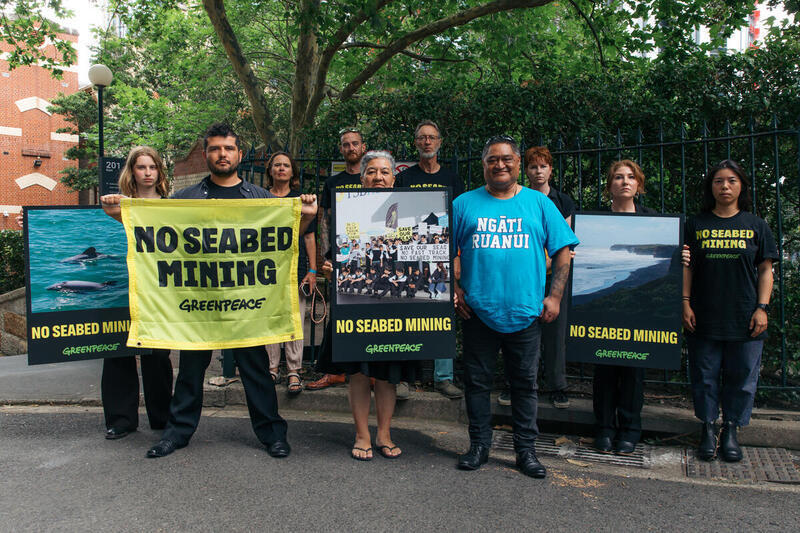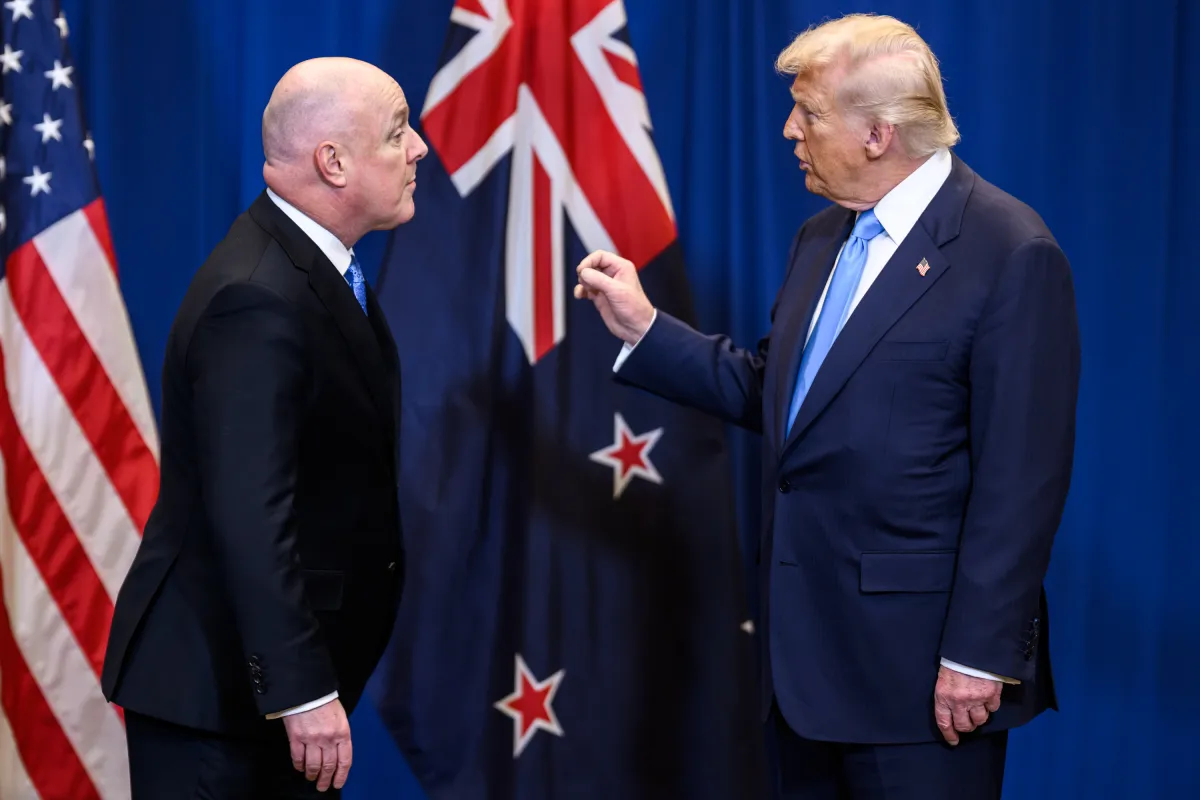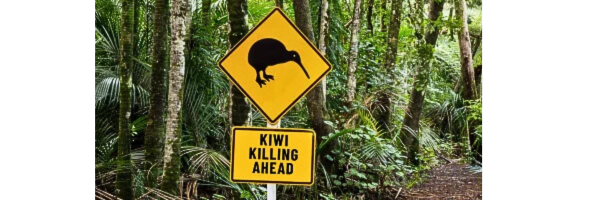July 20 2025 – On board the third Rainbow Warrior in Auckland
I te timatanga,
Ko te kore,
Te pō,
Ka puta ki te whai ao,
Ki te ao mārama,
Tihei mauri ora!
Ka mihi ki te moana ko Waitematā,
ki ngā maunga,
me ngā tūtohu whenua, o tēnei rohe.
Tēnā koutou
Ka huri tōku ngākau,
ki ā rātou kua whetūrangitia.
E te rangatira, Fernando Pereira.
Piata tonu mai,
hei kaiarahi ki runga i te whānau Greenpeace.
Ka maumahara tonu mātou ki a koe.
Nō reira
Ko ngā mate ki a rātou.
Ko ngā ora ki a mātou.
Tēnā tātou katoa
Ki te iwi Ngāti Whātua Ōrākei –
tāngata whenua me ngā kaitiaki o
Te Kahu Tōpuni o Tuperiri,
kei te mihi, kei te mihi
Ki ngā rangatira o Ngāti Kura, Ngāti Ruanui, Ngati Manuhiri
kei te mihi, kei te mihi.
Ki a koe e te rangatira Helen Clark,
He mihi nui, he mihi maioha ki a koe,
i te noho tahi i a mātou.
Ki a koe e te rangatira Ena Manuireva.
Kei te mihi, kei te mihi
Ki ngā hau e whā,
tena tātou katoa.
He hōnore nui tēnei, ki a Greenpeace Aotearoa
ki te noho tahi i a koutou.
ki te maumahara ki ngā tau whā tekau i muri.
He kaupapa whakahirahira tēnei,
hei maumahara ki te wā, i toro atu
te ringaringa anuanu o āitua ki a Aotearoa.
Ka whakapā atu ia, te mamae nui,
te mamae roa, ki te whānau ō
Rainbow Warrior tuatahi, ki te
whānau hoki o tō mātou hoa, ko Fernando Pereira.
He kaupapa whakanui hoki i tēnei
kaipuke, te Kāpene me te whānau
ō Rainbow Warrior ō nāianei.
Nō reira, tēnā koutou, tēnā koutou, tēnā koutou katoa.
Ka huri au ki te reo Ingarihi .
In the beginning is the void,
Then darkness,
Then the world of light,
Becomes the world of enlightenment,
It is the breath of life.
I acknowledge the ocean, the Waitematā, and the mountains of this place.
My heart turns to acknowledge those who departed us to return to the stars.
To the rangatira Fernando Pereira.
Keep shining as a guiding star above the Greenpeace family.
We remember you.
Therefore, we leave the dead to their world.
As we the living embrace ours.
To Ngāti Whātua Ōrākei, the people of this land, the custodians of the mantle of Tuperiri, I acknowledge you.
And to the rangatira of Ngāti Kura, Ngati Ruanui and Ngati Manuhiri here with us as our guests.
I acknowledge you also.
I warmly acknowledge you, the Rt Honourable Helen Clark and you Ena Manuireva, for being with us at this time.
To all from the four winds, I pay tribute to us all.
This is an important occasion to come together – to commemorate the time when the cold hand of tragedy reached across the oceans, to us here in New Zealand.
That hidden hand violently shook the foundations of the original Rainbow Warrior and her crew, while forever affecting the family of our friend Fernando Pereira.
We also gather today in celebration, to honour THIS ship, the current Rainbow Warrior, her captain and her crew.
Therefore, greetings once, twice, three times.
We have come together tonight, on the deck of the Rainbow Warrior, to reflect on the contemporary meaning of the bombing of the original Rainbow Warrior, 40 years after those tumultuous events.
I will make a few opening remarks, then hand over to our two special guests. We hope to have some time at the end for some questions.
Before we hear from them, let me draw two threads from the thick tapestry of this history.
For the last nearly 30 years we have lived in a Pacific which is no longer rocked and polluted by nuclear explosions. We have come to accept this as normal, as the status quo, the background to our lives.
But of course it wasn’t always so, and in a different history, it wouldn’t necessarily be so today.
The ending of nuclear explosions in the Pacific was the result of the work of many thousands of courageous people, and in whose debt we will always remain.
They sailed their small boats into the nuclear test zones, they rallied, they wrote letters, they declared their councils nuclear free, they lobbied politicians, they marched in the streets, here and around the world and across the Pacific.
And ultimately, thank goodness, they won.
The lesson I take is this: Ordinary people can bend the course of history for the better.
We are not prisoners of the past destined to repeat the same mistakes over and over.
We are not prisoners of those governments, and indeed corporations, who try to use their power to control the destiny of planet earth.
Collectively we have agency to make a better world.
In our current struggle for a stable climate, in our efforts to exercise our own collective rationality to keep earth habitable for our species and others, we are up against fossil fuel companies and agribusiness and their political allies.
We can draw strength from the history of the nuclear free Pacific campaign to have confidence in humanity’s ability to exercise collective agency and power to achieve our common good.
Of course there are no guarantees, and we have powerful opponents, but we know that people can change the course of history for the better because it happened right here.
The second thread I’d draw out of this tapestry, is the link between the struggle against colonialism and the struggle for a nuclear free Pacific.
Would the people of the Pacific willingly let the governments of the United States, Britain and France explode nuclear weapons on their islands? Of course not.
It was only possible because of the exercise of colonial power, and hence the struggle for a nuclear free Pacific was interwoven with the stuggle for self determination.
And while there have been many successful anti-colonial steps in the last decades, the shadow of colonisation still hangs heavy over us in the Pacific as well as around the world.
Sometimes it seems our climate and biodiversity challenges are further complicated by needing to address the shadow of colonialism. But as the nuclear free campaign demonstrated, the struggle to free ourselves of the legacy of colonisation can mobilise powerful people-led movements which can only help us confront other challenges, such as climate change.
I was looking recently on a wonderful photo of Father Walter Lini at the Takaparawhau occupation, Bastion Point in 1977.
Walter Lini was a leader of the movement for independence for Vanuatu, and he was there to provide solidarity to Ngāti Whātua Ōrākei in their struggle to regain their land, and I’m sure received solidarity in his struggle for independence for Vanuatu.
And what a tremendous legacy we have today from those acts of solidarity.
Ngāti Whātua Ōrākei took back their land at Takaparawhau and are replanting it with forests instead of millionaire mcmansions as was planned by the right wing Muldoon government; and Walter Lini became the first Prime Minister of an independent Vanuatu – a nation that today is an outspoken advocate for action on climate change and against the commencement of deep sea mining.
The environment movement, and everyone who longs for a sustainable future for their children, are the beneficiaries of those anti-colonial struggles.
There are many other threads that I’m sure our guests tonight will tease out our shared history, so I will leave you with those two thoughts.
Tēnā koutou, tēnā koutou, tēnā koutou katoa.



